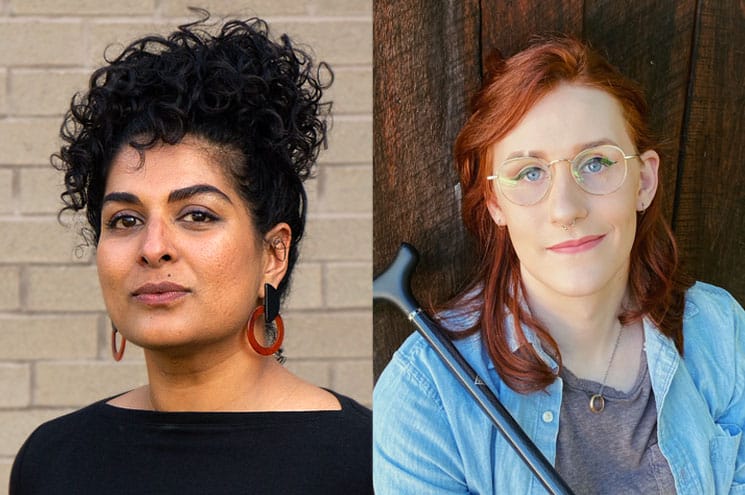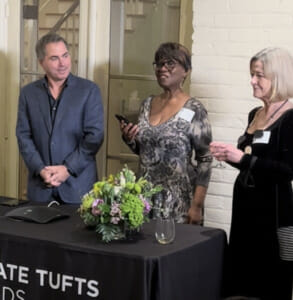Divya Victor’s ‘Curb’ Named 2022 Kingsley Tufts Poetry Award Winner

The 2022 Kate Tufts Discovery Award Goes to torrin a. greathouse for ‘Wound from the Mouth of a Wound’
The best poetry doesn’t offer an escape from the world but a way to engage with it, and prize-winning poet Patricia Smith hopes the work of this year’s Kingsley and Kate Tufts Poetry Award winners will become “the spark of many discussions that needed long ago to happen.”
For their stirring examinations of identity, displacement, violence, and other themes, Divya Victor has been chosen for the 2022 Kingsley Tufts Poetry Award for Curb (Nightboat Books); and torrin a. greathouse has been named the 2022 Kate Tufts Discovery Award winner for her debut collection Wound from the Mouth of a Wound (Milkweed Editions).
Victor will receive $100,000 as the recipient of the Kingsley award, which is one of the largest annual awards in poetry; Greathouse will receive $10,000 for the Discovery award, which honors the work of a poet at the start of his or her career.
They will receive their awards during a special ceremony April 20 on the CGU campus followed by a public reading and reception at the Los Angeles Public Library on April 21. As part of the Kingsley award, Victor also will return to the CGU campus in the fall for a week-long residency.

Poetry that Rattles the Rafters
Serving as this year’s chair of the judging committee, Smith (2018 Kingsley recipient for Incendiary Art) announced the selection of this year’s winners to a gathering of the Tufts community at a special call-the-winner event hosted this week by CGU President Len Jessup.
An associate professor of English at Michigan State University, Victor expressed both her shock and gratitude when she received the call.
“I feel like I’m floating. I feel like there’s been a loss of physics,” she said. She thanked the judges for seeing “what I was trying to do, what I was working to do. It was not a path that I knew until I took it, you know? Thank you.”
Curb has been described by critics as a hybrid collection that blends verse, prose, memoir and history in its examination of post-9/11 domestic terrorism in the United States and its brutal effect on the country’s South Asian communities.
“We think your book is going to rattle the rafters,” Smith told Victor. “We appreciate the work, the research, the way you zoned in and put us close to what we needed to know, the way you changed the conversation. I don’t think anything that comes after you will make as much impact.”
Similarly Smith praised Greathouse for a collection of poems that is not only “very confrontational, but that shows us things we never see, things that we’re afraid to confront, afraid to read, and I think this book will be the cause of many fantastic conversations.”
Greathouse discusses in a recent Kenyon Review interview how her debut book engages with self-mythologization, the perspectives of a trans woman who is also a person with disabilities, and the related “triangulated position of identity.”
When she received the phone call from Jessup—who was joined by Smith and Lori Anne Ferrell, the Tufts Awards director and dean of CGU’s School of the Arts & Humanities—the news left her nearly speechless.
Greathouse said she was stunned to have her book singled out from so many wonderful poets.
“I’m just honestly in awe,” she said.

A Collegial and
Supportive Judging Process
More than 300 books were submitted for consideration, and the work of winnowing down submissions to a pool of finalists was conducted by screeners Douglas Manuel, Lois P. Jones, and Alexandra Umlas.
The work of choosing the finalists was led by Smith along with Pomona College Professor of English Prageeta Sharma, City of Los Angeles Poet Laureate Lynne Thompson, Virginia Tech Professor of English Carmen Giménez-Smith, and 2019 Kate Tufts Discovery Award winner Diana Khoi Nguyen.
Smith said the judging process was robust but collegial and supportive.
“I’ve gotten lots of questions about how much blood was left on the floor and if we were all still speaking to each other,” she said. “I guess there are some judging situations where that is an issue. But we all brought our knowledge as poets to the table, our knowledge of what the world is like and what poetry is doing for it to the table, and we all respected each other immediately. It was very pleasant. I would like to get together with these ladies and discuss poetry any time.”
Smith gives high marks to the judging process
For Ferrell, the announcement of this year’s winners as the world faces so many troubling challenges–a global pandemic, continuing political divisions, a deeply unsettling war–couldn’t be more timely or necessary in reminding us of the importance of fostering (and keeping) human connections.
“Prolonged crises bring out the best, and the worst, in people,” she said, “Poetry is especially well-equipped to express—to cradle or corral—both the best and the worst, to acknowledge and give a voice to a full range of emotions. We need outlets for anger and despair as well as for love and comfort—poetry gets at the heart of these. That is what I think this year’s Tufts winners, and all of our finalists, are showing the world at a time when this is needed most.”
- Public reading and reception for the 2022 recipients of the Kingsley and Kate Tufts Poetry Awards: April 21, 2022, 7 p.m., at the Los Angeles Public Library. Register to attend
- Learn more about the Kingsley & Kate Tufts Poetry Awards and see a list of past recipients